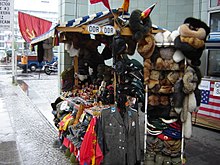


In German culture, Ostalgie (German: [ˌʔɔstalˈɡiː] ) is nostalgia for aspects of life in Communist East Germany. It is a portmanteau of the German words Ost (east) and Nostalgie (nostalgia). Its anglicised equivalent, ostalgia (rhyming with "nostalgia"), is also sometimes used. Another term for the phenomenon is GDR nostalgia (German: DDR-Nostalgie).
The term was coined by the East German standup comic Uwe Steimle in 1992.[1] Social scientist Thomas Ahbe argues that the term "ostalgia" is often misunderstood as a lack of willingness to integrate, an attempt to reverse German reunification and reinstate the GDR.[2] However, Ostalgia is rather an integration strategy used by East Germans who wanted to retain their own original experiences, memories and values incompatible with those of the West German majority.[3]
As with other cases of Communist nostalgia, there are various motivations, whether ideology, nationalism, wistfulness for a lost sense of social status or stability, or even aesthetics or irony.
In 2023, a poll found that while 52% of Germans living in the former East Germany identified as Germans, 40% identify as East Germans.[4][5]
- ^ "Ostalgiker Uwe Steimle bezeichnet sich als Kleinbürger". Hannoversche Allgemeine Zeitung (in German). 12 October 2012. Archived from the original on 10 October 2013. Retrieved 16 January 2016.
- ^ Ahbe, Thomas (2005). Ostalgie: zum Umgang mit der DDR-Vergangenheit in den 1990er Jahren (PDF) (in German). Landeszentrale für Politische Bildung Thüringen. p. 66. ISBN 978-3-931426-96-5.
- ^ Varvantakis, Christos (January 2009). "A monument to dismantlement" (PDF). Memory Studies. 2 (1): 27–38. doi:10.1177/1750698008097393. ISSN 1750-6980. S2CID 144579488.
- ^ "33 Jahre Wiedervereinigung".
- ^ Hoyer, Katja (7 March 2024). "What's 'wrong' with east Germany? Look to its long neglect by the wealthy west". The Guardian.